
views
For a moment, let us leave politics out. It is true that Varanasi is Prime Minister Narendra Modi’s Lok Sabha constituency. It is also true that Uttar Pradesh, India’s most populous and politically most important state, goes to the polls in February 2022. Winning Uttar Pradesh is crucial to the BJP’s remaining in power not only in the Hindi heartland but perhaps in the whole country.
As a run-up to the forthcoming elections in the state, many mega projects are being commenced, completed, or inaugurated. Nationally televised, they give the Modi-Yogi duo an opportunity to showcase their leadership and drive home the point that it is the BJP that has delivered most of its promises. It is the BJP that is dedicated to the progress and development of the state and the country. It is the BJP that the people should trust for their welfare. It is therefore the BJP that should be voted back to power.
Yet, as I said at the start, let us leave politics out for a moment. Even if we find that so hard to do, habituated as we are to see everything through a political lens. Instead, let us consider broader, civilisational issues. For, after centuries of colonisation and subjugation, there is so much at stake in India’s ongoing renaissance that exceeds and transcends immediate political losses and gains.
This is exactly what Narendra Modi demonstrated at the inauguration of the renovated Kashi Vishwanath Mandir complex and corridor to the Ganga on Monday morning. This extraordinary project, completed in a record time of just over two years, recreates the historic shrine precinct of the ancient and timeless city of Kashi, better known as Varanasi or Banaras.
It is said that this is the oldest continuously inhabited city in the world, with a history of lived occupation going back over 5,000 years. The whole city presided over by Shiva as the Lord of the Universe, is in fact a mandala, a yatra, a potent and powerful spiritual engine designed to shift the consciousness of not only its inhabitants, but also pilgrims who flock to it from all over India and the world.
Kashi is a microcosm not only of India but of the cosmos itself. Its sacred geography is surcharged with one primary purpose, its energy-body dedicated to one overwhelming aim. Moksha. Freedom. Emancipation. Liberation. Not only in the hereafter. This is why dying in Kashi is said to confer freedom from the cycle of life and death. But in the here and now.
The sacred Ganges turns north here, which means it takes you back to your source, which is the Self. For, we are all nothing but Shiva, nothing but pure consciousness, beyond space, time, birth, decay, and death. We are embodied, no doubt, but we are also timeless and infinite, forever one with the Divine. That is why Kashi is the eternal city.
In the presence of the undying and ever-burning funeral pyres, life, in all its richness and plenitude, also thrives, lived at its most intense, with joy and relish. Food, song, erotica, dance, wrestling, scholarship, arts, crafts, business, commerce — all point only to one goal. Self-making, self-realisation and, ultimately, transcendence, transformation.
Transforming Kashi has been Modi’s passion. From the new airport, there is an expressway that leads to the heart of the city in half an hour. The ghats are cleaner than ever before. The drains and gutters have been repaired. The riverfront has been beautified, with the sacred Ganga also saved and salvaged from much of the sewage, sludge, and industrial waste that used to drain into it.
Modi’s latest marvel is to expand a less than 3,000 sq ft temple into a 5.5 lakh sq ft complex, which can accommodate 50,000 pilgrims. Over 50 temples and older structures in the corridor were excavated, repaired, and restored in the process. The hundreds of families living in that crowded area were all relocated peacefully, adequately compensated, without prolonged resistance or litigation.
No one would have imagined that a project of this sort could have been pulled off. But, as they say, Modi hai to mumkin hai.
From Lalita Ghat, pilgrims can now carry water for abhishek to the Lord. The architect, Bimal Patel, was told by the prime minister that the experience of the pilgrimage should be uplifting. No congested and stinky lanes, with a crush of worshippers suffering so much indignity and exploitation. As Mahatma Gandhi himself did when he came to Banaras over a hundred years ago. Yogi Adityanath, the UP Chief Minister, referred to this incident, quipping that in Gandhi’s name so many people had come to power, but none of them had carried out his wishes or walked his path.
Aurangzeb destroyed the Kashi Vishwanath temple in 1669. Ahilyabai Holkar, the great Maratha queen, rebuilt it in 1780. Maharaja Ranjit Singh gilded the dome in 1835 with a tonne of gold. Many other Hindu rulers, including the Maharajas of Rajasthan and Nepal, tried to protect and restore this shrine. But now, it is Narendra Modi who has exceeded what any of them could accomplish. This is a sign of resurgent India, economically vibrant and culturally at ease with its identity.
Yes, from the highest metaphysical point of view, all of us are none other than Shiva. Shivoham, as Shankaracharya famously put it. But it is only Shiva as Modi who can rebuild His own temple. Shiva as the rest of us pilgrims must be elated and grateful. Conversely, Shiva as the members of the opposition or Modi-haters cannot but criticise or defame such efforts. All is Bhole Baba’s leela.
Likewise, when a civilisation, a people, a community, and a faith tradition are attacked and almost destroyed, a whole nation suffers indignity and humiliation. Desecrated temples and deities, mosques built on top of them, existing shrines in a pathetic or filthy condition, sacred rivers polluted and turned into effluent-carrying drains, corrupt and greedy priests and pandas, superstitions and distortions masquerading as scriptural traditions — all these and more are the symptoms of a wounded civilisation, if not an area of darkness, to invoke the titles of VS Naipaul’s books.
It is from all these that the nation is being rescued and restored. Whether it is modern infrastructure or spiritual restitution — both are necessary to regain self-respect and strength. Modi, knowing this all too well, said that he had faith in “Janata Janardan”, God-in-the-people. As to the shrine of a deity, he too had come to ask for three boons from his constituency. But these were neither personal nor politics. He sought cleanliness, creativity, and self-reliance, these being the pillars of Aatmanirbhar Bharat. That is why he thanked the humble workers who made his dream come true.
Whether Modi wins the next general election or not, whether Yogi Adityanath is re-elected as Uttar Pradesh’s chief minister or not, the work they have done in Kashi will not be forgotten. It will last hundreds of years, outliving them and all of us. That is why we should leave politics aside for a while and, once again, applaud Modi as India’s millennium man if not a miracle maker. A great disrupter, he is an even greater rebuilder.
The author is a professor of English at Jawaharlal Nehru University. The views expressed in this article are those of the author and do not represent the stand of the publication.
Read all the Latest Opinions here
















Comments
0 comment